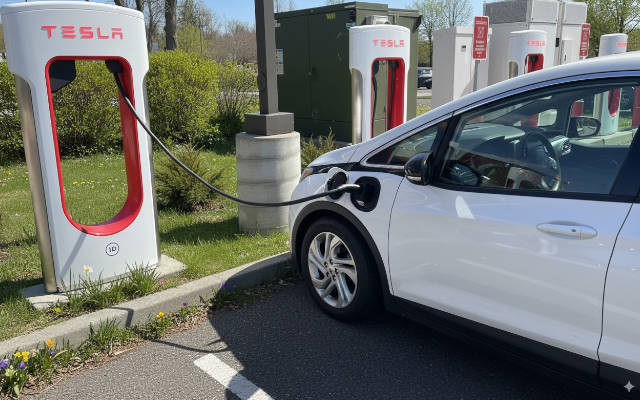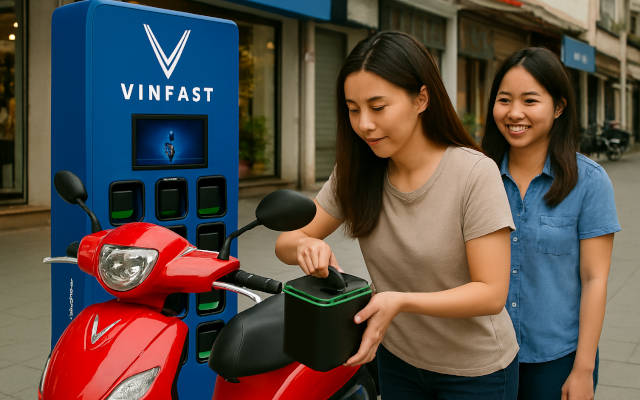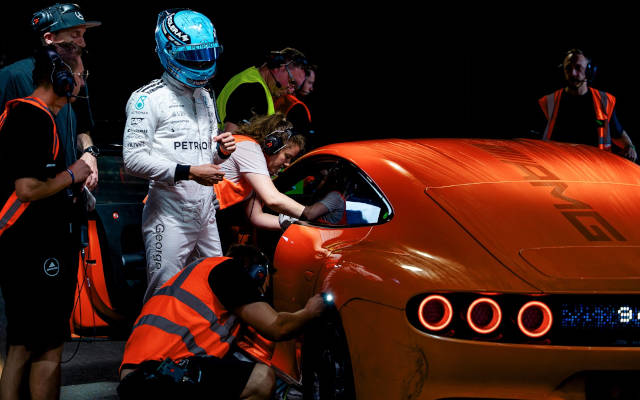 EDITOR'S PICK
EDITOR'S PICK
BMW Just Cranked Out Its 3 Millionth Electrified Vehicle
28 Aug 2025 | Synopsis
 BMW has built its 3 millionth electrified vehicle - a 330e plug-in hybrid assembled in Munich. This milestone includes both EVs and plug-in hybrids. In the first half of 2025, over 25% of BMW's global deliveries were electrified. The company also recently produced its 1.5 millionth fully electric vehicle, a Mini Countryman SE. BMW expects electrified sales to keep growing as part of its tech-neutral strategy.
BMW has built its 3 millionth electrified vehicle - a 330e plug-in hybrid assembled in Munich. This milestone includes both EVs and plug-in hybrids. In the first half of 2025, over 25% of BMW's global deliveries were electrified. The company also recently produced its 1.5 millionth fully electric vehicle, a Mini Countryman SE. BMW expects electrified sales to keep growing as part of its tech-neutral strategy.EV Adoption Stymied By Curious American Trait: Garage Clutter
28 Aug 2025 | Synopsis
 Telemetry's 2025 EV Charging Market Report reveals a surprising barrier to electrification: junky garages. One-third of U.S. homeowners can’t park in their own garages, limiting access to Level 2 charging. With 80% of EV charging done at home, cluttered spaces and costly installations threaten adoption. The report urges behavioral shifts and infrastructure investment to close the equity gap.
Telemetry's 2025 EV Charging Market Report reveals a surprising barrier to electrification: junky garages. One-third of U.S. homeowners can’t park in their own garages, limiting access to Level 2 charging. With 80% of EV charging done at home, cluttered spaces and costly installations threaten adoption. The report urges behavioral shifts and infrastructure investment to close the equity gap.Own a Bolt? Here Is How You Can Supercharge Today
28 Aug 2025 | Synopsis
 Chevy Bolt owners can now access Tesla Superchargers using GM's NACS-to-CCS adapter. After purchasing the dongle ($200–$300), download the Tesla app, link a payment method, and locate compatible stations. Charging to 80% costs around $20–$26. The adapter plugs into the Bolt’s front-left port, and etiquette matters—never block multiple stalls. This marks a major step toward EV charging interoperability and convenience.
Chevy Bolt owners can now access Tesla Superchargers using GM's NACS-to-CCS adapter. After purchasing the dongle ($200–$300), download the Tesla app, link a payment method, and locate compatible stations. Charging to 80% costs around $20–$26. The adapter plugs into the Bolt’s front-left port, and etiquette matters—never block multiple stalls. This marks a major step toward EV charging interoperability and convenience.VinFast Expands Electric Vehicle Incentives Nationwide, Plans Massive Battery-Swapping Network
27 Aug 2025 | Synopsis
 VinFast is launching a nationwide battery swapping network in Vietnam, aiming to deploy 150,000 stations to support its electric scooter expansion. Timed with National Day, the initiative includes new incentives and infrastructure to accelerate EV adoption. The swap stations offer fast, convenient battery replacement, reinforcing VinFast's push for sustainable urban mobility and positioning Vietnam as a leader in electric transport innovation.
VinFast is launching a nationwide battery swapping network in Vietnam, aiming to deploy 150,000 stations to support its electric scooter expansion. Timed with National Day, the initiative includes new incentives and infrastructure to accelerate EV adoption. The swap stations offer fast, convenient battery replacement, reinforcing VinFast's push for sustainable urban mobility and positioning Vietnam as a leader in electric transport innovation.The Mercedes-AMG GT XX Just Rewrote the EV Record Book
27 Aug 2025 | Synopsis
 The Mercedes-AMG GT XX Concept EV achieved 25 performance records during an eight-day testing campaign at Italy's Nardo Ring. Two prototypes covered over 24,855 miles, with one achieving 3,404 miles in 24 hours. Equipped with an 850 kW DC fast charger, the GT XX gains 124 miles of range in 10 minutes. Powered by a 1,360 hp all-electric powertrain, the GT XX demonstrates Mercedes' dedication to pushing the boundaries of EV performance.
The Mercedes-AMG GT XX Concept EV achieved 25 performance records during an eight-day testing campaign at Italy's Nardo Ring. Two prototypes covered over 24,855 miles, with one achieving 3,404 miles in 24 hours. Equipped with an 850 kW DC fast charger, the GT XX gains 124 miles of range in 10 minutes. Powered by a 1,360 hp all-electric powertrain, the GT XX demonstrates Mercedes' dedication to pushing the boundaries of EV performance.
 Si Exclusive
Si Exclusive
Hydrogen's Flight Path: Fuel Cells, Turbines, and the Economics of Clean Aviation
10 Oct 2025 |  Aviation is shifting from Jet A to four fuel systems: electricity, hydrogen (fuel cell and combustion), SAF, and petroleum. Fuel cells suit short-haul aircraft; hydrogen combustion may power long-range jets. SAF bridges legacy fleets. Hydrogen costs - $5-$7/kg today, possibly $2/kg by 2040 - impact ticket prices and infrastructure decisions. Airport authorities, airlines, and governments will share deployment costs. Each fuel has distinct environmental pros and cons shaping aviation's net-zero future.
Aviation is shifting from Jet A to four fuel systems: electricity, hydrogen (fuel cell and combustion), SAF, and petroleum. Fuel cells suit short-haul aircraft; hydrogen combustion may power long-range jets. SAF bridges legacy fleets. Hydrogen costs - $5-$7/kg today, possibly $2/kg by 2040 - impact ticket prices and infrastructure decisions. Airport authorities, airlines, and governments will share deployment costs. Each fuel has distinct environmental pros and cons shaping aviation's net-zero future.
 11 Oct 2025 00:07:34 UTC |
RECENT PODCASTS
BYD Soars - Cheaper Tesla Models - The Bolt is Back - Rivian
SEARCH RSSTREAM
 53 New Postings In Past 24 Hours
53 New Postings In Past 24 Hours
Category:finance
Region:NoAmerica
Date:10 Oct 2025
Category:policy
Region:NoAmerica
Date:10 Oct 2025
Category:mobility
Region:AsiaPacific
Date:10 Oct 2025
Category:mobility
Region:AsiaPacific
Date:10 Oct 2025
Category:finance
Region:NoAmerica
Date:10 Oct 2025
Category:finance
Region:IndoAsia
Date:10 Oct 2025
Category:energy
Region:Global
Date:10 Oct 2025
Category:energy
Region:NoAmerica
Date:10 Oct 2025
Category:finance
Region:NoAmerica
Date:10 Oct 2025
Category:finance
Region:Global
Date:10 Oct 2025